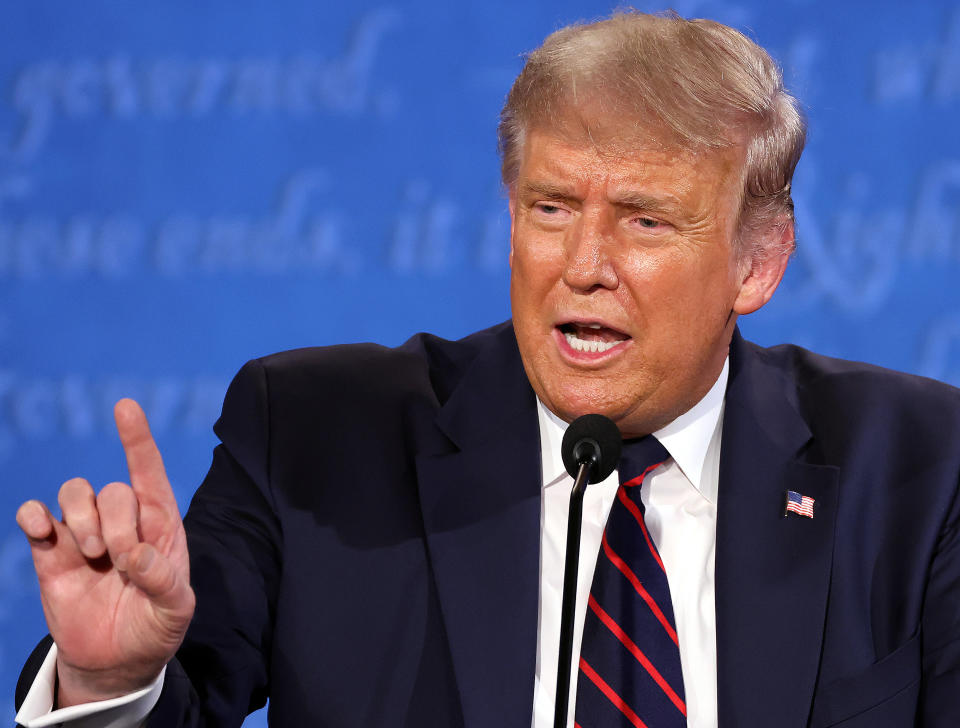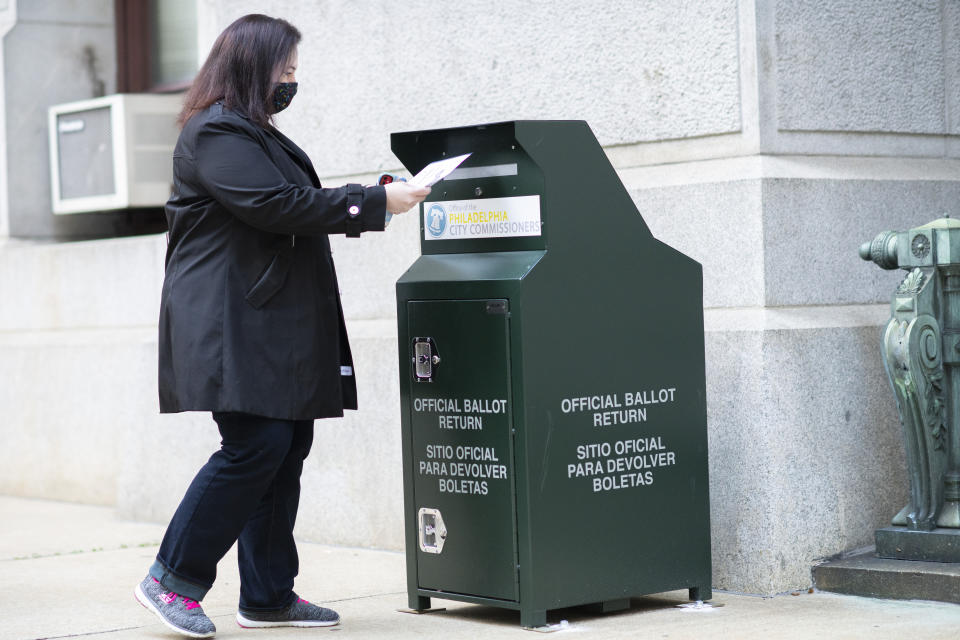Liberals worry Trump supporters will try to intimidate voters at the polls
The biggest challenge to stopping voter intimidation on Election Day will likely be separating out the legitimate complaints from an avalanche of reports, said a top official at the American Civil Liberties Union.
“We get reports every election. Sorting the signal from the noise is very difficult, and it’s going to be harder this year because people are so sensitive to this issue, rightfully,” Dale Ho, director of the ACLU’s Voting Rights Project, told Yahoo News.

“It’s really difficult to sort out what’s actually happening, especially when the rules are different in every state,” Ho said. “How close can you be to the polling place? Can you open-carry [a firearm]? What type of open carry?”
Government officials, federal, state and local law enforcement, legal groups and advocacy groups are all trying to prepare to identify and stop instances of individuals, or groups of people, acting in a way that threatens or intimidates voters at the polls.
In Pennsylvania, Attorney General Josh Shapiro, a Democrat, told Yahoo News that state officials have been working since June to coordinate law enforcement at the local, state and federal levels. They’ve established a hotline for Pennsylvania voters — 1-877-VOTESPA (1-877-868-3772) — that will route callers to the task force and provide them with a quick response if they encounter problems voting.
Worries about intimidation at the polls stem directly from President Trump’s rhetoric on the subject. Trump has relentlessly made false claims about Democrats cheating and rigging the election, and he has urged his supporters to go to the polls to try to prevent wrongdoing.
In the first presidential debate with Democratic rival Joe Biden, Trump specifically mentioned Philadelphia — the largest city in must-win Pennsylvania — as a place where cheating occurs. “I’m urging my supporters to go into the polls and watch very carefully, because that’s what has to happen. I am urging them to do it,” Trump said. “Bad things happen in Philadelphia. Bad things.”

Election fraud does happen, as Yahoo News has documented, but election experts and law enforcement officials across the board are adamant that fraud in American elections is confined to small-time, local incidents and does not make an impact on statewide or national elections. That includes incidents like one in Philadelphia, where an election judge pleaded guilty in March for adding 113 votes to help in local races over three elections several years ago.
Poll watchers, meanwhile, operate inside polling places and must be trained by the party or campaign and registered with election officials. In Pennsylvania, they must also be from the district in which they are watching.
Campaign poll watching “is done by the book,” said Paul M. Smith, vice president for litigation and strategy at the nonpartisan Campaign Legal Center. The real concern, Smith said, is “lone wolf” actions by people who come and stand outside polling places — maybe in groups, maybe with flags or signs, and possibly with firearms, depending on local laws.
Michigan Secretary of State Jocelyn Benson, a Democrat, issued an order on Oct. 16 banning the open carry of firearms within 100 feet of a polling place, clerk’s office or absentee-ballot counting board.
In Fairfax, Va., a group of Trump supporters chanting and waving flags gathered outside a polling place in mid-September, and some voters asked to be escorted inside by election officials. And a Miami police officer will face discipline after he was photographed this week wearing a Trump face mask while entering a polling place in uniform, on duty and carrying a firearm.
Here is @CityofMiami Police Officer Daniel Ubeda, in full uniform with badge and gun wearing his Trump mask inside of the polling location in government center.
This is city funded voter intimidation.
Ubeda should be suspended immediately. pic.twitter.com/TbJxu6mcem— Steve Simeonidis (@stevesimeonidis) October 20, 2020
But so far, there has not been the rash of incidents that some had feared. And Ben Ginsberg, a noted Republican law attorney who is speaking out on the president’s unfounded claims of cheating, said that concerns about intimidation could turn out to be overblown, since areas that vote heavily Democratic are usually “not exactly friendly territory” for those who might want to come in from other communities.
Nonetheless, the FBI is coordinating a multiagency effort to monitor reports of voter intimidation. And groups like the ACLU are preparing legal documentation to file if and when they determine that intervention is needed.
The first step, said the ACLU’s Ho, is to call election administrators at the local, county and state levels once a report of voter intimidation has been lodged. “And if none of that works, you go into court. And presumably if we can make a case very quickly, you come back and you have a court order that requires people to leave. That’s got to be enforced by someone,” he said.
The law enforcement agency required would depend on whether the case was decided in state or federal court. Ho said that in the past, he would have assumed that law enforcement would prevent most of these types of incidents from happening in the first place.
“You would have assumed a lot of things before this summer, but we saw white militias wreaking havoc in a lot of places and law enforcement not doing much to prevent that. We’ll have to see,” he said.
Pennsylvania Secretary of State Kathy Boockvar said this week that she expects most mail ballots to be counted by the Friday after the election, Nov. 6. During that week as the vote is counted, Shapiro, the Pennsylvania attorney general, said law enforcement will be vigilant in preventing interference as election officials count the ballots.

There are stiff criminal penalties across the country for engaging in voter intimidation. In Pennsylvania, such conduct can be punished with fines of up to $15,000 and prison sentences of up to seven years.
Shapiro’s office has played a central role in defending the state against litigation from the Trump campaign and the Republican National Committee. Republicans tried in court, and failed, to eliminate drop boxes, to get rid of “satellite” voting centers, to allow poll watchers to come from anywhere in the state, to require that mail ballots be inspected for signature matching, and to stop mail ballots from being counted if they arrive after Election Day, even if they were postmarked by Election Day.
The only issue on which courts ruled in the GOP’s favor was in upholding the requirement that mail and absentee ballots be placed in a privacy envelope and then placed in a mailing envelope, leading to the emphasis this year in public awareness campaigns to make sure voters don’t submit a so-called naked ballot.
“He has shown himself to be very litigious,” Shapiro said of Trump. “If he wants to bring another suit, we’ll beat him again. Hopefully he’s done with his lawsuits and will just respect the will of the voters here in Pennsylvania.”
Shapiro on Thursday released guidance for district attorneys and law enforcement that he said represented “historic preparations to ensure this election is free from fraud, interference, and intimidation — all of which undermine the bedrock of our democracy.”
“By working together, public officials have made voter fraud in Pennsylvania extremely rare, and we will continue that collaboration to prevent the intimidation of voters anywhere in our commonwealth,” Shapiro said.
One noteworthy detail in the lengthy guidance is that election workers in Pennsylvania — “judge of elections, inspectors, clerks, overseers” — “have immunity from arrest on Election Day and while tabulating and transmitting election returns except by arrest warrant for election fraud, felony, or for wanton breach of the peace.”
But, the guidance notes, poll watchers “are not considered election officials or officers under the Election Code and do not share the same privileges and immunities.”
_____
Read more from Yahoo News:




